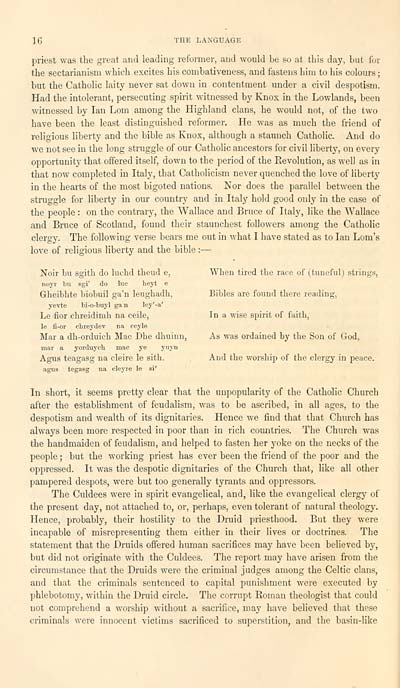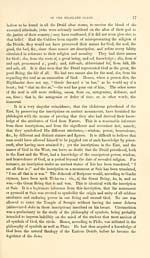Download files
Complete book:
Individual page:
Thumbnail gallery: Grid view | List view

16 THE LANGUAGE
priest was the great and leading reformer, and would be so at tliis day, but (ur
the sectarianism which excites his combativeness, and fastens him to his colours ;
but the Catholic laity never sat down in contentment under a civil despotism.
Had the intolerant, persecuting spirit witnessed by Knox in the Lowlands, been
witnessed by Ian Lom among the Highland clans, he would not, of the two
have been the least distinguished reformer. He was as much the friend of
religious liberty and the bible as Knox, although a staunch Catholic. And do
we not see in the long struggle of our Catholic ancestors for civil liberty, on every
opportunity that offered itself, down to the period of the Revolution, as well as in
that now completed in Italy, that Catholicism never quenched the love of liberty
in the hearts of the most bigoted nations. Nor does the parallel between the
struggle for liberty in our country and in Italy hold good only in the case of
the people : on the contrary, the Wallace and Bruce of Italy, like the Wallace
and Bruce of Scotland, found their staunchest followers among the Catholic
clergy. The following verse bears me out in what I have stated as to Ian Lom's
love of religious liberty and the bible : —
Noir bn sgith do luchd tbeud e, When tired tlie race of ( tiuieful) strings,
noyr bn sgi' do luc lieyt e
Gheibhte biobuil ga'n leugliadh, Bibles are found tliere reading,
yevte bi-o-buyl gan ley '-a'
Le fior chreidimh na ceile, In a wise spirit of faith,
le fl-or cbreydev na ceyle
Mar a dli-orduich Mac Dhe dhuinn, As was ordained by the Son of God,
mar a yorduych mac ye yuyn
Agus teagasg na cleire le sitli. And the worship of the clergy in peace,
agus tegasg na cleyre le Bi'
In short, it seems pretty clear that the unpopularity of the Catholic Church
after the establishment of feudalism, was to be ascribed, in all ages, to the
despotism and wealth of its dignitaries. Hence we find that that Church has
always been more respected in poor than in rich countries. The Church was
the handmaiden of feudalism, and helped to fasten her yoke on the necks of the
people ; but the working priest has ever been the friend of the poor and the
oppressed. It was the despotic dignitaries of the Church that, like all other
pampered despots, were but too generally tyrants and oppressors.
The Culdees were in spirit evangelical, and, like the evangelical clergy of
the present day, not attached to, or, perhaps, even tolerant of natural theology.
Hence, probably, their hostility to the Druid priesthood. But they were
incapable of misrepresenting them either in their lives or doctrines. The
statement that the Druids offered human sacrifices may have been believed by,
but did not originate with the Culdees. The report may have arisen from the
circumstance that the Druids were the criminal judges among the Celtic clans,
and that the criminals sentenced to capital punishment were executed by
phlebotomy, within the Druid circle. The corrupt Roman theologist that could
not comprehend a worship without a sacrifice, may have believed that these
criminals were innocent victims sacrificed to superstition, and the basin-like
priest was the great and leading reformer, and would be so at tliis day, but (ur
the sectarianism which excites his combativeness, and fastens him to his colours ;
but the Catholic laity never sat down in contentment under a civil despotism.
Had the intolerant, persecuting spirit witnessed by Knox in the Lowlands, been
witnessed by Ian Lom among the Highland clans, he would not, of the two
have been the least distinguished reformer. He was as much the friend of
religious liberty and the bible as Knox, although a staunch Catholic. And do
we not see in the long struggle of our Catholic ancestors for civil liberty, on every
opportunity that offered itself, down to the period of the Revolution, as well as in
that now completed in Italy, that Catholicism never quenched the love of liberty
in the hearts of the most bigoted nations. Nor does the parallel between the
struggle for liberty in our country and in Italy hold good only in the case of
the people : on the contrary, the Wallace and Bruce of Italy, like the Wallace
and Bruce of Scotland, found their staunchest followers among the Catholic
clergy. The following verse bears me out in what I have stated as to Ian Lom's
love of religious liberty and the bible : —
Noir bn sgith do luchd tbeud e, When tired tlie race of ( tiuieful) strings,
noyr bn sgi' do luc lieyt e
Gheibhte biobuil ga'n leugliadh, Bibles are found tliere reading,
yevte bi-o-buyl gan ley '-a'
Le fior chreidimh na ceile, In a wise spirit of faith,
le fl-or cbreydev na ceyle
Mar a dli-orduich Mac Dhe dhuinn, As was ordained by the Son of God,
mar a yorduych mac ye yuyn
Agus teagasg na cleire le sitli. And the worship of the clergy in peace,
agus tegasg na cleyre le Bi'
In short, it seems pretty clear that the unpopularity of the Catholic Church
after the establishment of feudalism, was to be ascribed, in all ages, to the
despotism and wealth of its dignitaries. Hence we find that that Church has
always been more respected in poor than in rich countries. The Church was
the handmaiden of feudalism, and helped to fasten her yoke on the necks of the
people ; but the working priest has ever been the friend of the poor and the
oppressed. It was the despotic dignitaries of the Church that, like all other
pampered despots, were but too generally tyrants and oppressors.
The Culdees were in spirit evangelical, and, like the evangelical clergy of
the present day, not attached to, or, perhaps, even tolerant of natural theology.
Hence, probably, their hostility to the Druid priesthood. But they were
incapable of misrepresenting them either in their lives or doctrines. The
statement that the Druids offered human sacrifices may have been believed by,
but did not originate with the Culdees. The report may have arisen from the
circumstance that the Druids were the criminal judges among the Celtic clans,
and that the criminals sentenced to capital punishment were executed by
phlebotomy, within the Druid circle. The corrupt Roman theologist that could
not comprehend a worship without a sacrifice, may have believed that these
criminals were innocent victims sacrificed to superstition, and the basin-like
Set display mode to: Large image | Transcription
Images and transcriptions on this page, including medium image downloads, may be used under the Creative Commons Attribution 4.0 International Licence unless otherwise stated. ![]()
| Early Gaelic Book Collections > Blair Collection > Treatise on the language, poetry, and music of the Highland clans > (28) |
|---|
| Permanent URL | https://digital.nls.uk/76236711 |
|---|
| Description | A selection of books from a collection of more than 500 titles, mostly on religious and literary topics. Also includes some material dealing with other Celtic languages and societies. Collection created towards the end of the 19th century by Lady Evelyn Stewart Murray. |
|---|
| Description | Selected items from five 'Special and Named Printed Collections'. Includes books in Gaelic and other Celtic languages, works about the Gaels, their languages, literature, culture and history. |
|---|

